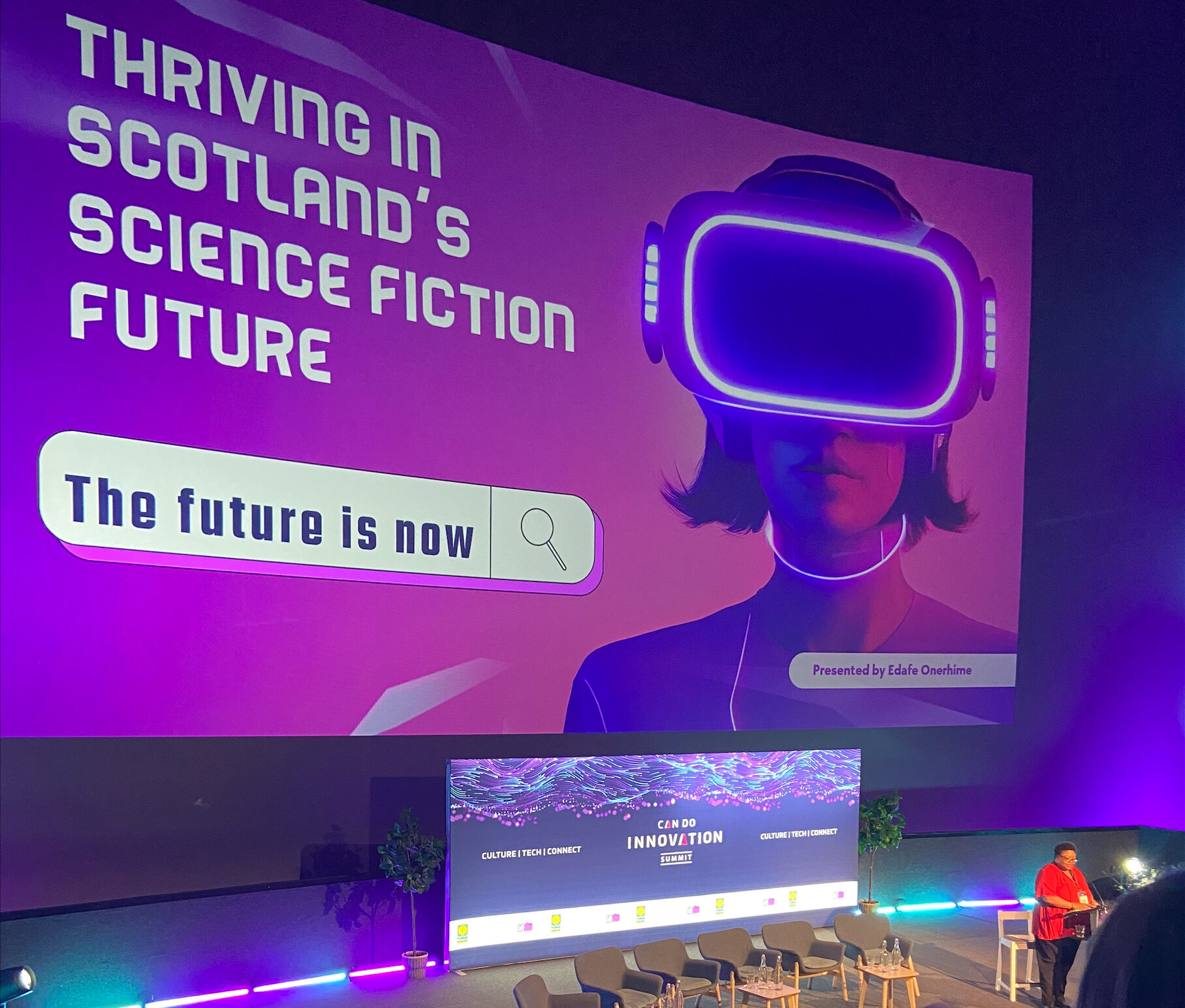On the 7th of November, innovation enthusiasts and industry leaders gathered at the iconic Glasgow Science Centre for the highly anticipated Can Do Innovation Summit. This was the first Can Do Innovation Summit Event hosted since the Covid-19 pandemic, and everyone was delighted to be back in person for an opportunity to discuss emerging tech and to network with likeminded people. Consultant, Rachel Sim, shares some key takeaways and insights from the event below.
The event was hosted by Glasgow City of Science and Innovation (GCOSI), and brought together a diverse group of people to celebrate innovation and discover the possibilities that lie ahead through the use of emerging technologies such as AI, XR and VR (to name a few). The Glasgow Science Centre was the perfect venue for the summit, with its futuristic architecture and fantastic facilities; a testament to the fusion of science, technology and art, which was at the heart of the summit’s mission.
The Can Do Innovation Summit featured an impressive lineup of keynote speakers, each of whom shared their unique perspectives on innovation, its challenges, and its impact on various industries. Notable speakers included tech entrepreneurs, industry disruptors and academics; all with a key message that collaboration of people and industries will be instrumental to Glasgow’s growth as a hub for innovation and tech.
The event opened with Dr Susie Mitchell (Glasgow City of Science and Innovation) and Stuart Patrick CBE (Glasgow Chamber of Commerce) introducing the event and current innovation initiatives happening in Glasgow. From the opening of the event, it was evident that we are already living in a world with access to innovations that previously could only have been dreamed of: science fiction has become science fact!
The Art of AI and Data
Keynotes from Edafe Onerhime (Top Twenty Most Influential Women in Tech) and Elena Corchero (Director of Emerging Tech at Dow Jones) followed. Edafe discussed practical use cases of AI and data, with examples from a variety of industries. Despite the vast range of opportunities highlighted, Edafe was also clear about the importance of safeguarding and optimising the use of technology through regulation and ethics as well as ensuring systemic bias is not embedded in AI. With AI set to impact every aspect of business from people, to processes, to operations (if it isn’t doing so already); organisations must ensure they understand their problems and how AI can be used to solve these, to exploit opportunities, and reduce ‘grunt’ work. The keynote left a resounding message that whilst technology and AI create fantastic opportunities, harmony is achieved when humans and technology work together; and whilst AI will optimise many aspects of business, people issues still require a people solution and we must not become over-reliant on new technologies.
Elena Corchero was interviewed by Chris Moule (Head of Innovation and Entrepreneurship at Robert Gordon University). The interview focused on Elena’s career path and emerging tech with a particular focus on its impact on the media. Elena shared why she is passionate about discussing STEAM rather than STEM and how art is so closely linked to science and technology; despite these disciplines being considered very different. With the gender gap still prevalent in technology, better understanding of the more creative aspects of technology could be instrumental in encouraging women and minorities to explore a career in technology. For example, art is crucial in product development; bringing a product to market and effectively communicating with potential consumers – a lack of artistic consideration may be the reason a product or idea fails.
Emerging Technologies
As an expert in emerging technologies, Elena discussed how new innovations should be approached – questioning “why is this meaningful” and what is the benefit of said new technology – jumping on each new hype may result in wasted time, resources and opportunities. With each new technology, a balance must be reached between use and misuse – with all the controversy surrounding AI this sentiment is very appropriate.
Elena finished her discussion with an insight into the markets she expects to grow in the coming years, with wearable technology at the heart of this. She discussed how technology and humans are becoming closer than ever and it won’t be long before technological implants become commonplace.
Other presentations shared real-life examples of AR in practice in the healthcare sector; discussions on sustainability and ESG, the SME support and funding available in the region, and Glasgow’s opportunity to be at the heart of technological advancements. It was evident that not only is there a wealth of opportunity in terms of funding, infrastructure and technology, but that the people of Glasgow form a fantastic network of support for passionate innovators.
Summit Summary
The Can Do Innovation Summit wasn’t just about listening to presentations, it was a dynamic and interactive event. Breakout sessions allowed attendees to engage in discussions, workshops, and hands-on activities. These sessions encouraged collaborative thinking, enabling participants to explore solutions to real-world problems. The summit also featured innovation showcases, where forward-thinking companies and startups presented their cutting-edge products and services.
The Can Do Innovation Summit was a fantastic event, leaving attendees informed and inspired. The event showcased the power of innovation to transform industries, improve lives, and create a better future for all. The takeaways from the summit were clear: innovation is not just a choice, it’s a necessity in our rapidly evolving world.
We look forward to attending again next year!
If you are a client looking to build out your technology team, or a candidate looking for a move, please get in touch with Rachel or Ali for a confidential discussion: [email protected] / [email protected]






